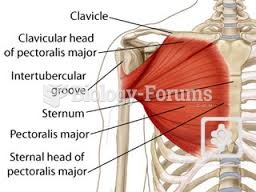Answer to Question 1
Iron
Functions: Part of the protein hemoglobin, which carries oxygen in the blood; part of the protein myoglobin in muscles, which makes oxygen available for muscle contraction; necessary for the utilization of energy as part of the cells' metabolic machinery
Deficiency: Anemia: weakness, fatigue, headaches; impaired work performance and cognitive function; impaired immunity; pale skin, nail beds, mucous membranes, and palm creases; concave nails; inability to regulate body temperature; pica
Toxicity: GI distress; Iron overload: infections, fatigue, joint pain, skin pigmentation, organ damage
Sources: Red meats, fish, poultry, shellfish, eggs, legumes, dried fruits
Zinc
Functions: Part of many enzymes; associated with the hormone insulin; involved in making genetic material and proteins, immune reactions, transport of vitamin A, taste perception, wound healing, the making of sperm, and the normal development of the fetus
Deficiency: Growth retardation, delayed sexual maturation, impaired immune function, hair loss, eye and skin lesions, loss of appetite
Toxicity: Loss of appetite, impaired immunity, low HDL, copper and iron deficiencies
Sources: Protein-containing foods: red meats, shellfish, whole grains; some fortified cereals
Iodine
Functions: A component of two thyroid hormones that help to regulate growth, development, and metabolic rate
Deficiency: Simple goiter, cretinism; Underactive thyroid gland, goiter, mental and physical retardation in infants (cretinism)
Toxicity: Underactive thyroid gland, elevated TSH, goiter
Sources: Iodized salt, seafood, bread, dairy products, plants grown in iodine-rich soil and animals fed those plants
Selenium
Functions: Defends against oxidation; regulates thyroid hormone
Deficiency: Predisposition to heart disease characterized by cardiac tissue becoming fibrous (Keshan disease)
Toxicity: Loss and brittleness of hair and nails; skin rash, fatigue, irritability, and nervous system disorders; garlic breath odor
Sources: Seafood, meat, whole grains, fruits, and vegetables (depending on soil content)
Copper
Functions: Necessary for the absorption and use of iron in the formation of hemoglobin; part of several enzymes
Deficiency: Anemia, bone abnormalities
Toxicity: Liver damage
Sources: Seafood, nuts, whole grains, seeds, legumes
Manganese
Functions: Cofactor for several enzymes; bone formation
Deficiency: Rare
Toxicity: Nervous system disorders
Sources: Nuts, whole grains, leafy vegetables, tea
Fluoride
Functions: Strengthens teeth; helps to make teeth resistant to decay
Deficiency: Susceptibility to tooth decay
Toxicity: Fluorosis (pitting and discoloration of teeth)
Sources: Drinking water (if fluoride containing or fluoridated), tea, seafood
Chromium
Functions: Enhances insulin action and may improve glucose tolerance
Deficiency: Diabetes-like condition
Toxicity: None reported
Sources: Meats (especially liver), whole grains, brewer's yeast
Molybdenum
Functions: Cofactor for several enzymes
Deficiency: Unknown
Toxicity: None reported; reproductive effects in animals
Sources: Legumes, cereals, nuts
Answer to Question 2
manganese







